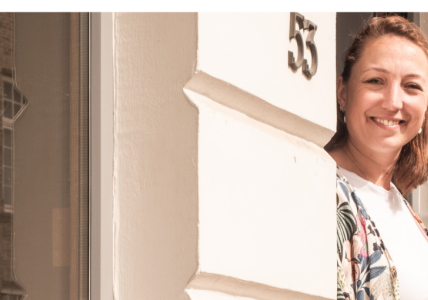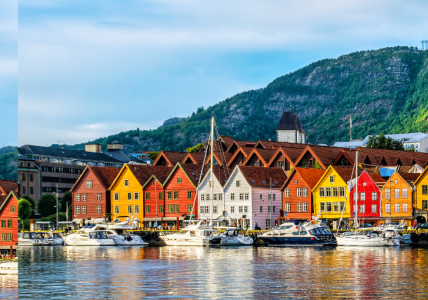25 years ago the first North Sea programme was launched. Since this time transnational cooperation in the Region has helped hundreds of innovators get their game-changing ideas off the ground.
Standing proud
The programme has gradually evolved in line with Europe's ever developing agendas and has gone from strength to strength with a growing budget and number of projects. Today the North Sea Programme stands proud. And with good reason. Let us find out why.
The evolution of the North Sea Programme
Before sharing the successes of the programme, let's start with a history lesson. In 1997 the first North Sea Region Programme was adopted and the idea to start fostering cooperation between the countries of the North Sea was realised. Below you can see a visual overview of each programme period. Each period has always reflected the most current European Agenda as well as overall economic, socio and geopolitical landscape. The backdrops of the programme; transnational cooperation, regional development and spatial planning have remained throughout its history.

Head of Secretariat, Christian Byrith has been with programme almost since its inception and has been hands on in its progression over the years;
"The North Sea programme embarked on its journey in 1997 and I have had the good fortune to be part of this journey almost all of the way, first by being partner in a North Sea project and subsequently as part of the secretariat. It has been a joy to see the programme take shape and become an important tool for the stakeholders in the North Sea region. "
Interreg and the North Sea programme has assisted stakeholders in turning their project ideas into action, cooperating and help making our region a better place to work and live in. Ultimately this is what Interreg is all about and bearing in mind our common challenges e.g. within innovation, green transition and the preservation of nature, cooperation programmes such as the North Sea programme are needed more than ever!

Transnational project development workshop on Innovation in Cambridge, UK in 2007 where the new Interreg IVB North Sea Programme was presented.
This takes us to the present day Interreg VIB North Sea programme 2021-2027 which warmly welcomed France as a new member country and new regions in both the Netherlands and Flanders - giving a total of nine new regions. The programme is still going strong and with their inclusive, bottom-up and non-competitive focus, our projects continue to contribute to build cohesion, thus strengthening the sociopolitical landscape of the region.
Why Viborg, Denmark?
The idea to set up an Interreg programme in Viborg, Denmark was driven by the then President of the North Sea Commission Bent Hansen, who wanted to enable organisations in different North Sea countries to work together and find solutions to problems which were common to those living in the Region. It so happened that the President was also the Mayor of Viborg County Council, Denmark. Since its inception, the secretariat has remained in Viborg and hosted five Interreg programmes.
Cooperation with the North Sea Commission
The programme and North Sea Commission have continued to work closely together over the past twenty five years. Amongst other activities, the two organisations have held yearly joint conferences together since 1997. During the conferences, the North Sea Commission members participate in joint workshops alongside project developers and stakeholders from the North Sea Programme. The workshops provide a crucial meeting point for both organisations and enable them to align on joint priorities and focus points.
Our loyal friend – the starfish
The programme logo 'the starfish' has been with us for many years. A glass starfish is occasionally given as a gift to projects and programme stakeholders who have made an exceptional contribution to the programme. This initiative is known as the 'Order of the Starfish'.

Left: Lorraine George and Alistair Moffat showcasing the unique handmade glass starfish at the North Sea Conference in Aviemore, Scotland 2006 - the highest mark of distinction that any North Sea enthusiast can obtain in our programme. Right: Ingrid Kürsten receiving the Starfish at Monitoring Committee no. 1 Hannover, Germany 2022 after many years working with the programme.
Many hands make light work
Programmes like ours don’t become what they are without the help of dedicated and committed colleagues. Politicians, committee members, national contact points, programme management and staff are all part of the ingredients to the programme's success. The 'let's make it happen' attitude shared by all has ensured that programme after programme has ensued.

Members of the Monitoring Committee and Joint Secretariat gather after their fist meeting in Hannover, Germany, June 2022

Our National Contact Points in Bremen, May 2022
Adapt and overcome
Despite each and every programme period bringing its own set of challenges, the programme has provided a reliable and stable platform for organisations around the North Sea region to come together and work on joint projects together. It is remarkable that on both the programme and project side each trial and tribulation has been embraced and seen as an opportunity to develop new solutions amid difficult times.
This extraordinary resilience and creativity become evident during the COVID-19 crisis when so many of our projects immediately started to look for new solutions.

The Innofest production team live in studio - 2020. Photo: Tom van Huisstede
RISING UP TO THE CHALLENGE
When festivals shut down, this seemed to ruin the project InnoQuarter's main concept of testing innovations at festivals. But rather than giving up, they charged ahead with new concepts such as mini-festivals and online events where the participants tested products from home.
InnoQuarter collaborated with Innofest at the Dutch Oerol festival in the summer of 2020. Innofest was working with the festival but because the physical festival was cancelled they worked together to invent an alternative.
GOING HYBRID
The daring team of SURFLOGH organised a hybrid event so that the City of Mechelen could sign a zero emissions convenant with their logistics stakeholders whilst another 170 people joined online. With a small professional team to support the live-streaming, SURFLOGH pulled it off.
The COM³ project gathered its team to discuss how the Covid-19 crisis affected its pilots. The project team used MURAL boards to visualise the concerns and opportunities of their project. By voting on the most pressing issues, they created a starting point to adapt the pilots.
We saw this workshop as a good opportunity to not ignore the effect of covid-19 on the pilot activities, but to also pay attention to smart and creative approaches that can inspire and motivate other partners.
Bringing it home: project impacts
Over the past 25 years our projects have delivered an amazing array of durable results and achievements – many of which have generated considerable additional investment from the public and private sectors.

PEDAL POWER
The project North Sea Cycle Route project was initiated in 1998 in order to develop a continuous signed cycle route around the region. Although bordering the same sea it goes from land located below sea level (in the Netherlands) to cliffs of 300 meters in height (Norway). The route has gained fame as the longest cycle route in the world, and now has 7,050 kilometers of signposted trails along North Sea coastline, passing eight different countries on the way. Thousands of cyclists use the route every year.

Timber terminal at the Skaraborg Logistics Centre in Sweden first phase 2012.
INVESTMENT AND JOBS
Although the DRYPORT project closed 10 years ago, its impacts are still growing. The project provided proof of concept for dryports - smart inland freight hubs that connect ports with the railway system. Among much else, the project initiated two dryports. They have since evolved to become logistics hotspots in Sweden and the Netherlands. Investors have put more than €50 million into the Swedish dryport alone, creating 200 jobs. A private company is now investing €24 million to expand the dryport further.

Complementing dredging operations, the project tackled problems of sewage water overflow ending up in the Potmarge river in the Netherlands and explored how urban spatial planning could integrate water to stimulate local development
WIN WIN SOLUTIONS
The project Water City International II (a follow up of the the Water City International project) used water in urban spatial planning as a tool to stimulate social and economic development. With a total project budget of €10 million, Water City International II generated additional investments of over €50 million across the partner cities already within its lifetime.
More than a decade has passed since this project ended, yet the results keep snowballing. The Interreg Water City International projects were a very important catalyst of this capitalisation process.

Scene from the Wantij Zone of Dordrecht, the Netherlands. Blue-green infrastructure not only helps in reducing flood risk. It also offers urban dwellers the chance to enjoy more natural surroundings within the city
CLIMTATE RESILIENCE AT ITS BEST
The project BEGIN promotes blue-green infrastructure - such as parks and rivers - to reduce urban flood risk by 30%. So far, the measures put in place have achieved an estimated damage reduction of over €10 million by project end. The project has so far involved over 5,700 citizens in designing and managing new blue-green infrastructure. Based on BEGIN’s success, its social innovation approach has been adopted in regional and national policies throughout the North Sea and included in master plans and investment programmes worth over €1 billion. The project was awarded the REGIOSTARS Public Choice Award in 2021.
The North Sea Conference - a true tradition

Warming up for the online North Sea Conference which was streamed in 2020 from Aalborg, Denmark
The programme continues to work closely with the North Sea Commission each year in preparing and delivering the North Sea Conference. In 2017 the conference celebrated its 20th year anniversary. The event was located within the German city of Göttingen and over 300 participants joined from all over the region to seize the opportunity to network and gather ideas for new projects. In 2020 the COVID-19 pandemic forced the conference online. Undeterred, the organisers and participants braced the concept wholeheartedly and welcomed 280 guests online from an empty football stadium in Aalborg, Denmark.

Participants during a team building exercise at the 2018 North Sea Conference in Østfold, Norway

Participants during a workshop at the North Sea Climate Conference in 2019, Marstrand, Sweden

Participants getting into the swing of things at the North Sea Conference in Bruges, Belgium 2011
Our Interreg Family
Some colleagues have been on board for the entire journey, others have left and joined again bringing with them new skills and experiences. New project developers have emerged along the way and others stuck with the programme for over two decades. All of whom have made their special mark on the programme. Regardless of changes and challenges a friendly 'can do attitude' has always prevailed. There is one distinctive phrase referred to within the programme and that is our 'Interreg' family – and after 25 years and so much time together this phrase seems highly appropriate.
The future looks bright!
In close cooperation with its stakeholders, the programme has managed to navigate through turbulent times and stay focused on its core goal - supporting and facilitating transnational cooperation projects. 25 years have passed.
Head of the German delegation to the North Sea Monitoring Committee, Carsten Westerholt has worked with the programme closely for years;
"Since its inception 25 years ago, the North Sea programme has come a long way. It started as a community initiative and is now part of the European Union’s own Interreg regulation. As a programme under shared management it has since connected Lower-Saxony with stakeholders all around the North Sea to find solutions for joint challenges. These solutions have always been an inspiration to do things differently and to enable adaptation."
The challenges when it comes to climate change, natural resources, energy transition, and not to forget a war in the middle of Europe have not become smaller and so the demand for joint solutions to keep the North Sea region a place where people are at the heart of its future development is crucial.
Our projects continue to innovate and share their findings, increasing the pace at which knowledge advances. Their hard work and achievements have been time and time again been recognised though various awards and prizes. For example, when the VB project Lean Landing project was presented with the Grand Jury Prize in the 12th edition of the European Enterprise Promotion Awards (EEPA) run by the European Commission. This is a special prize awarded to the entrepreneurial initiative considered the most creative and inspiring in Europe.
We very much look forward to the coming years; promoting integrated solutions, continuing to break down mental barriers and bringing the citizens of Europe closer together. The future looks bright: 17 projects were approved in Call 1 and these are now kicking off their activities and networks. The programme continues to pick up steam with 59 applications received during Call 2 which closed on the 14 November. It is all go.

Celebrating the programme's 25 birthday with cake at the 2022 North Sea Conference in Bruges - courtesy of the Province of West Flanders.
Top image: North Sea Conference 2016, Billund, Denmark.



